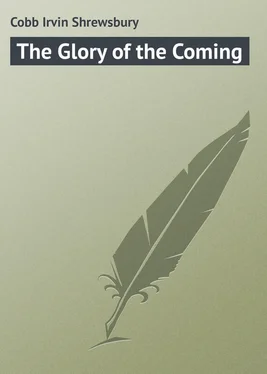Irvin Cobb - The Glory of the Coming
Здесь есть возможность читать онлайн «Irvin Cobb - The Glory of the Coming» — ознакомительный отрывок электронной книги совершенно бесплатно, а после прочтения отрывка купить полную версию. В некоторых случаях можно слушать аудио, скачать через торрент в формате fb2 и присутствует краткое содержание. Жанр: foreign_prose, foreign_language, на английском языке. Описание произведения, (предисловие) а так же отзывы посетителей доступны на портале библиотеки ЛибКат.
- Название:The Glory of the Coming
- Автор:
- Жанр:
- Год:неизвестен
- ISBN:нет данных
- Рейтинг книги:3 / 5. Голосов: 1
-
Избранное:Добавить в избранное
- Отзывы:
-
Ваша оценка:
- 60
- 1
- 2
- 3
- 4
- 5
The Glory of the Coming: краткое содержание, описание и аннотация
Предлагаем к чтению аннотацию, описание, краткое содержание или предисловие (зависит от того, что написал сам автор книги «The Glory of the Coming»). Если вы не нашли необходимую информацию о книге — напишите в комментариях, мы постараемся отыскать её.
The Glory of the Coming — читать онлайн ознакомительный отрывок
Ниже представлен текст книги, разбитый по страницам. Система сохранения места последней прочитанной страницы, позволяет с удобством читать онлайн бесплатно книгу «The Glory of the Coming», без необходимости каждый раз заново искать на чём Вы остановились. Поставьте закладку, и сможете в любой момент перейти на страницу, на которой закончили чтение.
Интервал:
Закладка:
Having established ourselves, we set about the task of securing the coveted transportation up to the vicinity of the planes of contact between the Allies and the enemy. The shelling had somewhat abated since our arrival, so we made so bold as to trudge across town to the railroad station, encountering but few persons on the way. In the immediate neighbourhood of the station the evidences of recent strafing were thicker even than in other parts of the old city. Where an hour before a shell had blown two loitering French soldiers to bits, a shattered stone gateway and a wide hole in the ground and a great smearing of moist red stains upon the upheaved earth spelled the tale of what had happened plainly enough. A withered old man was doing his feeble best to patch together the split and sundered planks of the gate; the bodies, what was left of them, had been removed by a burial squad.
At the railroad terminal there was pressing need for everything that went on wheels, and of a certainty there was nothing in the nature of a self-propelled vehicle available for the use of three men who came bearing no order that would give them the right to commandeer government equipment. So our next hope, and seemingly our last one, lay in the French. At a certain place we found numbers of kindly and sympathetic officers with staff markings on their collars, who professed to be glad to see us, at the same time expressing a polite surprise that a trio of unannounced American newspaper men should have dropped in upon them, seemingly out of the shell-harassed skies above.
But when we suggested we would appreciate the loan of an automobile and with the automobile an officer to escort us up to the battle front they lifted eyebrows, shoulder blades and arms toward heaven, all in the same movement signifying chagrin and regret. What we asked was quite impossible, considering the exigencies and emergencies of the moment. The most formidable engagement that ever had been or perhaps ever would be was in midblast. Every available bit of motive power was required; every available man was required.
Besides, the roads, as doubtless we knew, were blocked with reënforcements hurrying up to support the hard-pressed British north of the Aisne. Any other time, yes. But now – no, and once again, no. We were quite free to stay on in Soissons if we cared for a place temporarily so unhealthy. We might have free access to any of the maps or records on hand. We might visit any of the hospitals or rest camps in the immediate vicinity. But further than that our new friends could not go. They added, by way of advice, that our best course would be to return straightway to Paris and come again when the crisis had passed and the sector to the north had somewhat quieted.
There being nothing else to do, we took a walk to think things over. The walk ended at our stopping place just as the German guns north of us beyond the river resumed their afternoon serenade. More refugees were coming into the town in a long dismal procession from Chauny and Ham and Noyon and scores of smaller places. Some of them had been on the road for twenty-four hours, some for as long as forty-eight hours. They had rested a while in wrecked and empty villages during the preceding night, then had risen at daybreak and resumed their heart-breaking pilgrimage, with no goal in sight and no destination in view, and only knowing that what might lie ahead of them could never by any chance be half so bad as what the Germans were creating behind them.
At the beginning of this war, in Belgium and again in Northern France, not many miles from where we then were, I had seen on the edges of the vortex of battle and destruction many such eddying, aimless streams of human flotsam and jetsam of war; but to one who knew the facts of their case the present plight of these poor wanderers had a special appeal. For this was the second time they had been dispossessed from their small holdings, the second time they had fled in huddles like frightened sheep before the path of the grey invader, the second time all that they owned had been swept away and smashed up and wasted beyond repairing.
Driven out of their homes in the first four weeks of the war, back in 1914, at the time of the great onslaught against Paris, they had been kept away from these homes for more than two years, all during the German occupation of their territory. After the great victory of the Allies over von Hindenburg in the Aisne country they had returned, tramping back in pairs and groups to the sites of their homesteads, filled with the tenacious impulse of the French peasant and the French villager to reroot himself in his native soil; had returned to find that before the Germans retreated beyond the Chemin des Dames they, in accordance with orders from the all-highest command, sawed down the fruit trees in the little orchards and burned the houses that had sheltered them, and tore up the vines and shovelled dung into the drinking wells.
Nevertheless, the repatriates had set to, working like beavers to restore a sorry semblance of the simple frugal communal system under which they and their fathers before them had existed since the Napoleonic wars. And now, just when they were beginning to patch together the broken ends of their lives, when with aid from the French Government and aid from Americans they had cleared and planted their devastated fields and had built new habitations for themselves out of the ruins of the old ones, again the enemy had come down upon them like a ravening wolf on a fold; and again they had run away, deserting all they could not carry in their arms or upon their backs, and knowing full well in the light of past experience that the Germans either would garner the work of their hands or else would make an utter end of it.
At a corner just above the hotel we came upon a mother and her family of nine. She was less than forty years old herself; her husband was a soldier at the Front. She wore wooden sabots on her feet, and upon her body a tattered, sleazy black frock. Her eldest child was fifteen years old, her youngest less than six months. For the ten of them to travel a distance of twelve miles had taken the better part of two days and two nights. The woman had contrived a sling of an old bed sheet, which passed over one of her shoulders and under the other; and in this hammock contrivance she had carried the youngest child against her bosom, with her bodice open at the breast so the baby might suckle while she pushed a crippled perambulator containing the two next youngest bairns. The rest of the brood had walked all the way. They were wearied beyond description; they were incredibly dirty and famishing for want of proper sustenance, but not a single one of the small wretches who was old enough to speak the word failed to murmur “ Merci, merci ,” when the neighbours brought them bowls of hot soup and gave them sups of warm milk and put big slices of bread smeared with jam into their dirty, clawlike little hands.
Having wolfed down the food they squatted, all of them, against a house front to wait for the camion which would take them to a refuge in a Red Cross station a dozen miles away. They had to wait a good while, since all the available wagons were engaged in performing similar merciful offices for earlier arrivals. The children curled up in little heaps like kittens and went to sleep, but the mother sat on a stone doorstep with her babe against her bare flesh, over her heart, to keep it warm, and stared ahead of her with eyes which expressed nothing save a dumb, numbed resignation.
An old priest in a black robe came along and he stopped, being minded, I think, to utter some message of comfort to this wife of a soldier of France, and in her way, I say, as valorous a soldier as her husband could be, did he wear twenty decorations for bravery. But either the priest could find no words to say or the words choked in his throat. Above her drooped head he made with his hand the sign of the cross in the air and went away. And as I stood looking on I did in my heart what any man with blood in his veins would have done had he been there in my stead – I consigned to the uttermost depths of perdition the soul of the Brute of Prussia whose diseased ambition brought to pass this thing and a million things like unto it.
Читать дальшеИнтервал:
Закладка:
Похожие книги на «The Glory of the Coming»
Представляем Вашему вниманию похожие книги на «The Glory of the Coming» списком для выбора. Мы отобрали схожую по названию и смыслу литературу в надежде предоставить читателям больше вариантов отыскать новые, интересные, ещё непрочитанные произведения.
Обсуждение, отзывы о книге «The Glory of the Coming» и просто собственные мнения читателей. Оставьте ваши комментарии, напишите, что Вы думаете о произведении, его смысле или главных героях. Укажите что конкретно понравилось, а что нет, и почему Вы так считаете.












